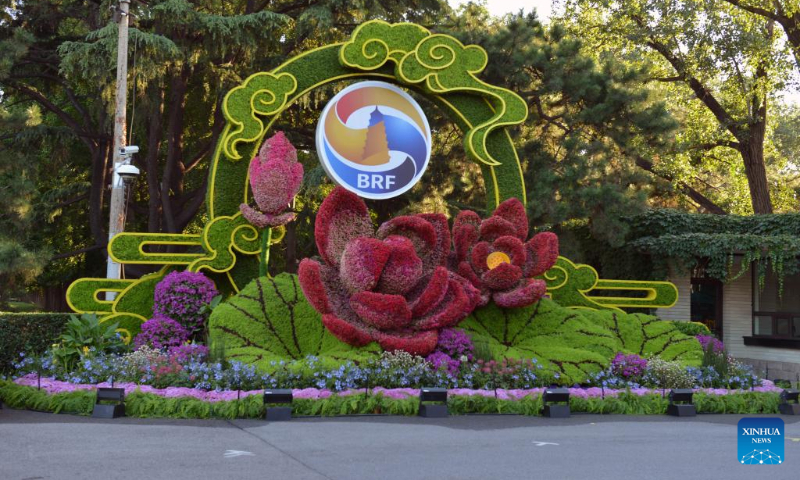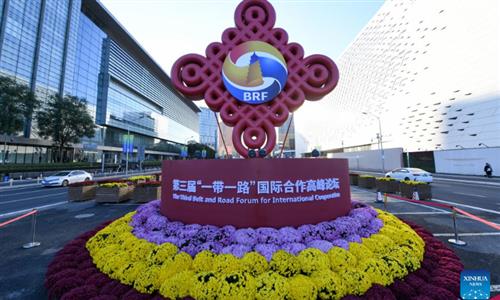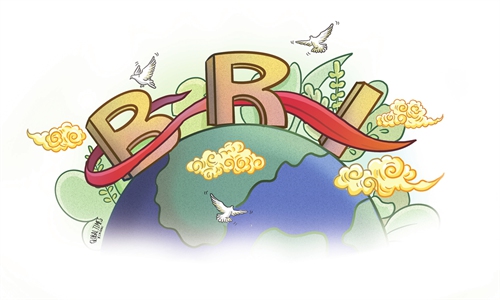Putin’s BRF attendance represents generally positive perception of BRI among Russian elites

This photo taken on Oct. 14, 2023 shows a floral decoration for the third Belt and Road Forum for International Cooperation (BRF) near Diaoyutai State Guesthouse in Beijing, capital of China. The BRF will be held from Oct. 17 to 18 in Beijing. (Xinhua/Ren Chao)
Russian President Vladimir Putin is attending the third Belt and Road Forum for International Cooperation (BRF) from October 17 to 18 in Beijing. In an interview with a Chinese media outlet before his trip, Putin said that the initiative is a "perfect match" with Moscow's vision for regional development.President Putin's high praise represents the generally positive perception of the BRI among Russia's elites and the public. A decade ago, many people in Russia were critical of the BRI out of deep-rooted geopolitical thinking, and even believed that China was trying to "marginalize Russia's influence." However, facts speak louder than words. During the past 10 years, the BRI has not only become one of the significant driving forces of China-Russia cooperation, but also promotes the Eurasian economy, in which Russia, as one of the most important countries participating in the BRI, shares the benefits of its development. This constitutes the basis for the Russian elites and public to shift their perception of the BRI from negative to positive.
The gas pipeline, Arctic cooperation and the first highway bridge in Northeast China's Heilongjiang Province between China and Russia are landmarks marking great progress. To take the geopolitical point of view that Russia was "forced by the situation" to cooperate with China, would be too narrow. In a world undergoing major changes unseen in a century, the development of the BRI in the past decade demonstrates China's national strength growing by leaps and bounds. Compared with a decade ago, China's market volume and investment capacity are significantly different now.
The Russian elites specifically emphasize that cooperation with China and participation in the BRI will provide a guarantee for the prosperity of Russia. As a result, they made the decision to push for cooperation with China.
Especially after Russia's relations with the West hit rock bottom following the outbreak of the Russia-Ukraine conflict in 2022, cooperation with China is seen as the key to escaping from diplomatic isolation and providing new impetus for the economy. Against this background, Russia has accelerated its "turn to the East" strategy centered on relations with China. This year, Russian officials at all levels have come to China to promote bilateral economic and trade cooperation, and attract investment from Chinese enterprises in Russia. The term "BRI" is also more and more frequently mentioned by Russian officials. It is quite likely that after President Putin attends the Belt and Road Forum, more Russians will be driven to learn about China and join in China-Russia cooperation.
During President Xi Jinping's visit to Russia in March this year, the two heads of state agreed on a long-term plan for China-Russia pragmatic cooperation in the areas of trade, investment and connectivity. In the following months, intensive consultations between Chinese and Russian government departments have achieved a series of important outcomes. President Putin's visit to China will also confirm and put into practice the results of President Xi's trip to Russia in March.
For China, President Putin's attendance at the BRF bears another meaning: it along with the presence of leaders of other countries is a rebuff to the West's attempts to isolate the BRI. Representatives from over 130 countries and more than 30 international organizations have confirmed their plans to attend the forum. This shows that Western stigmatization, smear and even threats are now incapable of arousing the determination of non-Western countries to seek development and prosperity for their people.
The positive response of Russia and other countries also objectively proves that the BRI is by no means a geostrategic tool for China to challenge the US hegemony as claimed by the Western media, because a major power like Russia, which is full of national pride, is certainly not willing to act as a political tool for other countries. The decade-long construction of the BRI has already played an exemplary role. The prospect of sharing the dividends of development is attracting more and more countries to participate in this initiative.
The author is a scholar from the China National Institute for SCO International Exchange and Judicial Cooperation. opinion@globaltimes.com.cn


